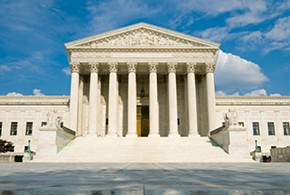Rights and wrongs

The idea of human equality is a powerful political force rooted ultimately in a theological vision—the belief that all people bear the image of God, are equally valued by God, and possess gifts meant to be developed and shared with others. Implementing this vision in practical terms remains an ongoing political challenge, as was clear from the mix of Supreme Court decisions handed down last month.
The equality of gay and lesbian citizens was affirmed when the court struck down the section of the Defense of Marriage Act that denied federal recognition and benefits (like Social Security) to married same-sex couples. In declaring that portion of the law unconstitutional, the court observed that its principal purpose was “to demean . . . persons in lawful same-sex marriage,” a violation of the Constitution’s guarantee of equal protection under the law.
Read our latest issue or browse back issues.
The court’s action hardy ends the debate over same-sex marriage (see p. 13), and in some ways it further unsettles the legal landscape. (What happens, for example, when a same-sex couple married in New York moves to Alabama, where same-sex marriage is not allowed? Are they married in the eyes of the federal government?) But there’s little doubt that both in the courts and in public opinion the momentum is moving toward giving same-sex couples the equal standing they deserve as they assume the responsibilities and privileges of marriage.
Meanwhile, however, the goal of equal citizenship for blacks and other minorities suffered a significant blow when the court dismantled the Voting Rights Act, which was first passed in 1965 and renewed by Congress in 2006. The court declared that nine states, mostly in the South, could now change their election laws without securing federal approval. The court pointed to the impressive statistical gains in black voting in the South, which it said showed that the VRA was out of date and an unnecessary intrusion on states’ rights.
The dissenting judges made a forceful objection: those gains reflected the impact of the very law the court was tossing out. The court’s action, said Justice Ruth Bader Ginsberg in dissent, “was like throwing away your umbrella in a rainstorm because you are not getting wet.” Ginsberg noted that between 1982 and 2006, the Department of Justice blocked more than 700 proposed voting changes that it deemed discriminatory. Countless other proposed changes were revised to meet DOJ guidelines.
Efforts to suppress voting by minorities have been widespread in recent years and are likely to increase without the protective umbrella of the VRA. We can expect, for example, proposals for redistricting and for at-large voting methods that have the effect of limiting black and Latino political influence.
Such methods of denying equality may be less obvious than that of refusing to issue gays a marriage license, but they are no less significant. Indeed, judging from the latest Supreme Court rulings, race may present a much deeper division in American life than homosexuality and remain the greatest challenge to equality.






